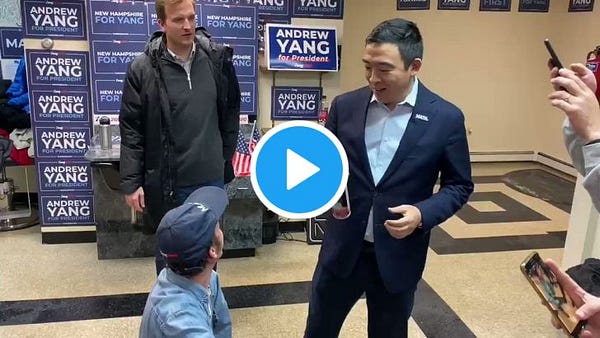Andrew Yangkee: Champion of Memes, Math & Murder
While known for his outside-the-box ideas, Yang’s foreign policy views are very much within the realm of the swamp.
Andrew Yang made a name for himself during the 2020 Democratic presidential primary, primarily by being nothing like the other candidates. More interested in meme causes than bread and butter issues, Yang’s name was synonymous with the words “outsider,” “memes,” and “math.”
But how different was he, really?
Hours after it was reported that the Israeli apartheid regime had murdered nine Palestinian children in the Gaza ghetto, Yang tweeted his unquestioning support for Israel.
“I'm standing with the people of Israel who are coming under bombardment attacks, and condemn the Hamas terrorists,” he wrote. “The people of NYC will always stand with our brothers and sisters in Israel who face down terrorism and persevere.”
Since Yang’s tweet, the hashtag “#YangSupportsGenocide” has trended.
Many have brushed this off as cynical pandering to New York City’s large and politically powerful Jewish community, as Yang has gone from democratic primary laggard to frontrunner in the city’s democratic mayoral primary. But is it really out of step with his previous foreign policy rhetoric?


After all — Yang was known for his quirky remarks and millennial sensibilities, how could he take such a loathsome, if run-of-the-mill stance on this issue?
During his presidential campaign, his crowds were primed to chant “Math!” when he talked numbers. The Washington Post noted that he was a “former gamer” when he talked about regulating video game “loot boxes.” He was billed as “the candidate for the end of the world." He made headlines for planning to campaign as a hologram. The New York Times said of the democratic field: “Only one of them will be focused on the robot apocalypse.” He made campaign stops at hip hop concerts. He was the only candidate to take a stance against circumcision, in favor of thorium reactors, and even promised to, as president, eliminate the penny and “empower MMA fighters.”
He even had the support of Silicon Valley oddball oligarchs like Elon Musk and Jack Dorsey.
In its typically stupid fashion, the media pontificated about whether Yang Gang was comprised of Gen Z’ers or White Nationalists.
Even though the Democratic field was crowded, it was clear that one of them was not like the others.
But when it came to foreign policy, a topic rarely discussed by Yang, he took standard democrat positions, much like his recent stance on Israel.
While he was praised by alternative media for signing a pledge to end the “forever wars,” — a nebulous term that coming out against provides enough wiggle room to get away with maintaining the status quo — the majority of his stated foreign policy positions aren’t so different from his former campaign rival Joe Biden.
Queried by the New York Times, Yang said that he would “consider military force for a humanitarian intervention,” that the United States should “maintain its current level of military aid to Israel,” that he does not support the Boycott Divestment and Sanctions movement, that Russia should be considered an adversary or enemy of the US, and that normalizing U.S.-China relations and trade should be “contingent on China’s closing its internment camps for Uighurs.”
For the sake of brevity, I’ll simply be sharing some quotes from the meme king himself:
China:
The treatment of the Uighurs in China is unacceptable, and we need to be a part of the chorus of voices across the world calling the situation out for what it is. It’s also troubling to see China take a more aggressive stance throughout the region, whether towards Hong Kong, Taiwan, or in the South China Sea.
There are aspects of Chinese behavior that are deeply problematic—their piracy of intellectual property. … They have taken advantage of frameworks to their own benefit, and we haven’t had some of the same benefits.
Their system of government is becoming increasingly authoritarian as they develop more technologies that allow them to monitor and control their population. It’s important that we work with our allies to combat the spread of this authoritarian capitalism, and provide a model for democratic capitalism.
We need to make sure China isn’t stealing our IP or exporting their authoritarianism to other countries, and we must ensure that we have reliable access to rare earth metals.
I think most Americans stand in solidarity with the people of Hong Kong.
[We should use diplomacy] to build a coalition to help us put pressure on China in terms of the treatment of their ethnic minorities and what’s going on in Hong Kong.
Russia:
Russian aggression in Ukraine is a blatant violation of international law, and we have the obligation to work with our allies to act.
Russian aggression is a destabilizing force, and we must work with our allies to project a strong and unified face against Russian expansionism.
The Russian interference in Ukrainian elections was a precursor to their interference in US elections.
I’d say [to Russian President Vladimir Putin] “I’m sorry I beat your guy.” Second I would say ‘the days of meddling in American elections are over and we will take any undermining of our democratic as an act of hostility and aggression.” The American people would back me on this, we know that they’ve found an underbelly and they’ve been clawing at it and it has made it so we can’t even trust our own democracy.
We need to expand sanctions against Russia, and Putin and members of his government specifically through the Global Magnitsky Act, in order to pressure the country to play by international rules.
Bolivia:
It’s hard to tell whether there was widespread fraud or interference in the last election.
Venezuela:
The United States must promote free and fair elections in Venezuela to determine their next leader. The most recent elections were obviously marred by fraud, intimidation, and voter suppression.
The United States must push with our allies for Maduro to step down, through diplomacy, and through sanctions targeted at Maduro and his supporters. We must also work with Guaido, and with him consider amnesty for some of Maduro’s military support to entice them to support Guaido as President of the National Assembly and interim President.
Iran:
Iran is a destabilizing force in the region.
We need to build on the [JCPOA] to get Iran to stop destabilizing the region, attacking our allies, funding terrorist organizations, and causing conflict in the Strait of Hormuz.
Israel:
Israel has been an important ally to the US, and it will continue to be an important ally. It is a democracy in a region where that is rare.
In addition to his response to the New York Times rejecting BDS, Andrew Yang recently wrote that “not only is BDS rooted in antisemitic thought and history, hearkening back to fascist boycotts of Jewish businesses, it’s also a direct shot at New York City’s economy. Strong ties with Israel are essential for a global city such as ours, which boasts the highest Jewish population in the world outside of Israel.” Yang was, in essence, comparing non-violent anti-colonial resistance to Nazism.


In an interview with the alternative media show Secular Talk, Yang defended this position citing his on the record support for a “two-state solution,” which he characterized as a “fairly mainstream perspective.”
Yang is absolutely correct that the two-state solution is mainstream: it is supported by everyone from former CIA Director John Brennan, who recently penned an op-ed in which he pushed it, to Congresswoman Alexandria Ocasio-Cortez.
The two-state solution is an easy answer to a problem that few can bring themselves to admit. It gives Israelis control over the geographically and economically important areas while Palestinians get a Jackson Pollock-style archipelago of overpopulated safe havens with few natural resources. Any serious progressive, at this point, is advocating for a one-state solution with equal rights for all citizens, not a segregationist policy we could call Jafar Crow.
While Andrew Yang may not have much influence over US foreign policy should he get elected as Mayor of New York City, this kind of analysis of his positions was missing when it really mattered — while he was running for president. Yang enamored the left with his young and hip charade, popularizing fresh ideas like a universal basic income despite his mostly rotten, imperialist positions.
Because of the next to zero scrutiny the left gave to Yang’s foreign policy positions until his tweet on Monday supporting Israel as it bombs Gaza, I thought it was important to revisit this history in hopes that it will inform us for the future. I also propose a new nickname for the mayoral candidate: Andrew Yangkee.
And with this nickname, I humbly put forward this offering to the meme king of 2020.
Did you enjoy reading this article? I value the free exchange of information, so I don’t put anything behind a paywall. Consider kicking me a few bucks on PayPal to support my independent reporting or becoming a patron.
A note to media outlets: You are free to re-publish my writing in-full with the following text at the bottom:
Alex Rubinstein is an independent reporter on Substack. You can subscribe to get free articles from him delivered to your inbox here, and if you want to support his journalism, which is never put behind a paywall, you can give a one-time donation to him through PayPal here or sustain his reporting through Patreon here.














